Renewable Materials Conference 2026 — Save the Date: 22–24 September in Siegburg/Cologne (Germany)
Defossilisation through innovation: Early bird registration, exhibition and workshop booking, as well as submissions for abstracts and innovations for the "Renewable Material of the Year 2026" award are now open
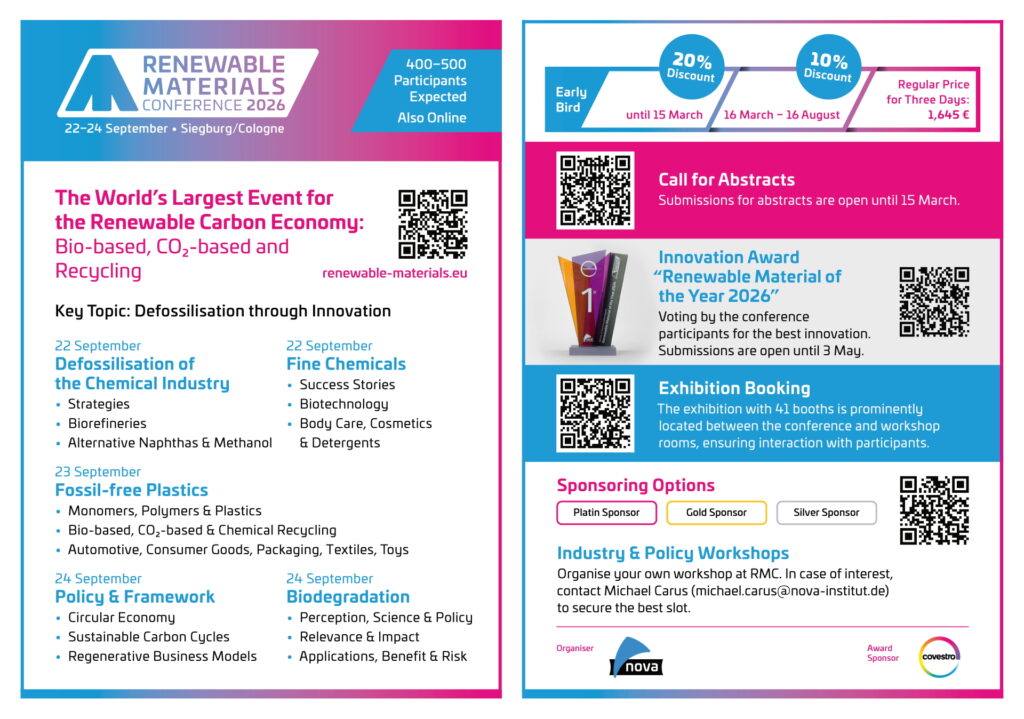
In just a few years, the Renewable Materials Conference (RMC) has established itself as the international meeting place for innovators, companies and brands, investors and policymakers to come together to develop and shape the future renewable carbon economy. As in previous years, the conference organiser nova-Institute expects 400-500 participants from around the world.
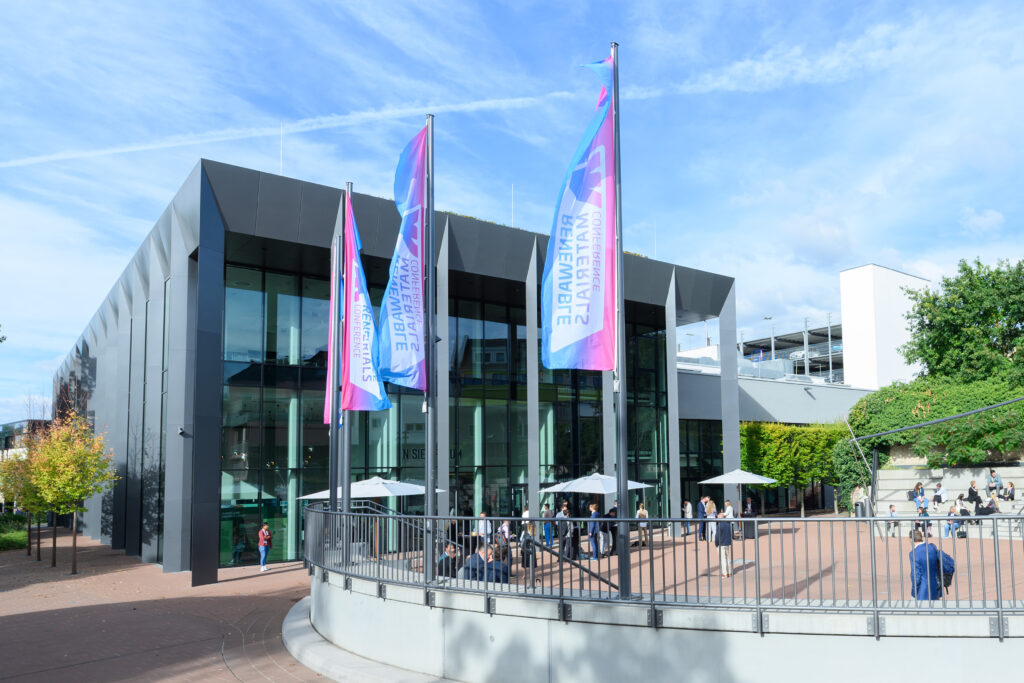
The extraction of fossil resources from the ground and their use in the energy and chemical sectors is by far the largest contributor to human-made climate change, accounting for 90% of greenhouse gas (GHG) emissions. While in the energy sector decarbonisation is the way forward, there is currently the debate whether a climate-neutral chemical and plastics sector is possible without phasing out fossil fuels. But defossilisation is increasingly emerging as the only viable path forward, i.e. to change the carbon source from fossil to renewable carbon derived from biomass, CO₂ and recycling.
Defossilisation offer strategies for maintaining market access and focusing investors and financial institutions on portfolios with long-term profitability. The Renewable Materials Conference provides an important platform to explore these opportunities, address uncertainties and help companies build a future-proof, competitive position in the renewable economy, by answering the following questions: How to defossilise the chemical industry and remain competitive? How to meet the demand for fossil-free plastics? How to create sustainable carbon cycles? What role will biodegradation play in a future circular economy?
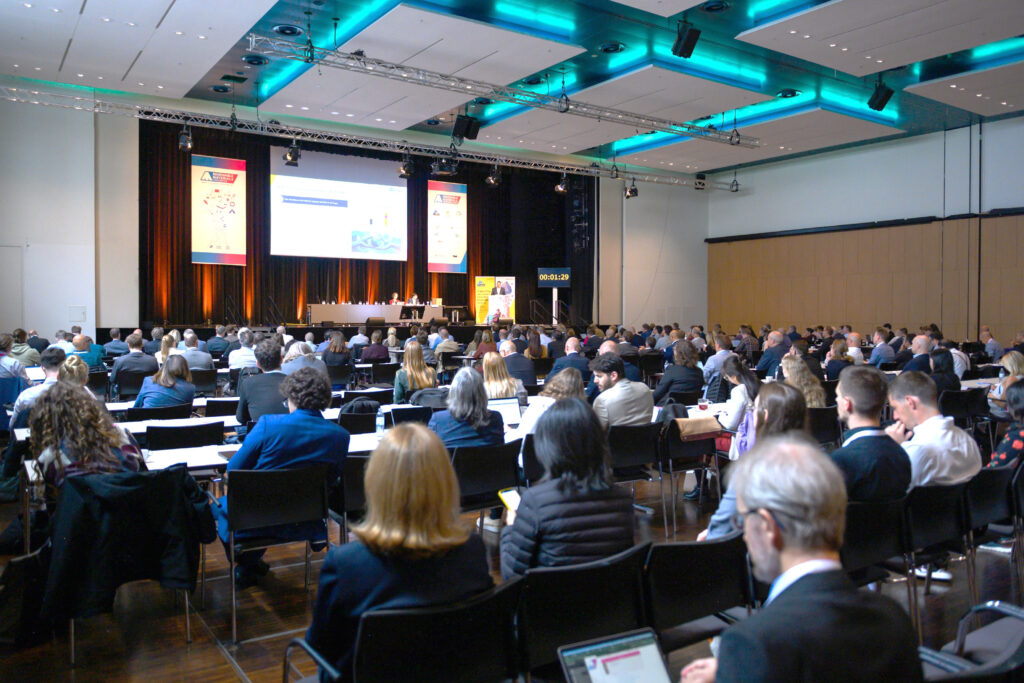
To this end, the conference will present numerous talks with experts and provide exceptional networking opportunities, feature a tabletop exhibition, poster sessions, as well as workshops on most urgent topics. There will also be the opportunity to vote for the “Renewable Material of the Year 2026” innovation award, sponsored by Covestro (DE).
Conference topics in detail – Defossilisation through Innovation
22 September: Defossilisation of the chemical industry: This critical topic area covers alternative naphtha, biorefineries, waste valorisation, chemical recycling and carbon capture and utilisation (CCU) – all of which represent solutions for both commodities and fine chemicals. Additionally, sustainable and renewable feedstocks as well as the circular economy will be addressed,
The day will conclude with a highlight Panel Discussion on “Competitiveness and Strategic Autonomy“, a crucial aspect for realising defossilsation.
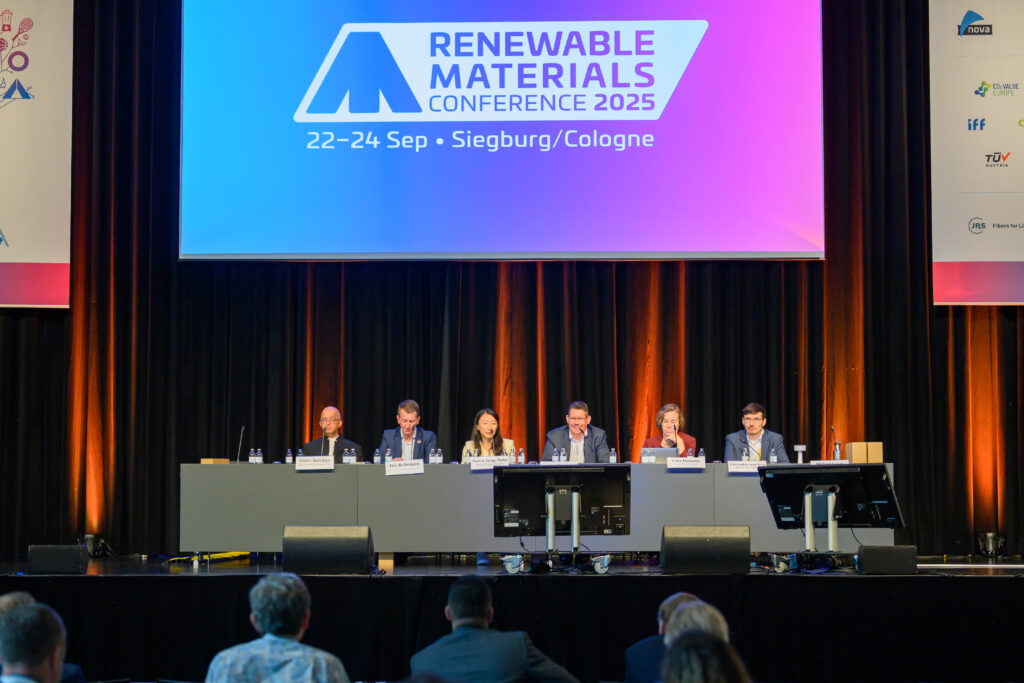
23 September: Fossil-free plastics: With more than 20 polymers already commercially available from biomass, CO₂ and chemical recycling, this topic area offers solutions for all sectors, including packaging, textiles, automotive and consumer goods.
The second conference day culminates with the election of the prestigious Innovation Award "Renewable Material of the Year 2026”.
24 September: Policy and Framework, Regenerative Business Models: This day addresses policies, market demands, relevant frameworks and innovative business models that are needed for a successful transition to renewable carbon and sustainable carbon cycles.
The third day is also dedicated to the special topic of Biodegradation: What are the latest scientific and policy developments and new trends for biodegradation – the organic cycle?
From today on, early bird registration, exhibition and workshop booking, submissions for abstracts and innovations for the 'Renewable Material of the Year 2026' award are open:
- 20% discount on all tickets until 15 March 2026, afterwards 10% discount until 16 August 2026
- Deadline for abstract submission: 16 March 2026
- Deadline for submission of innovations for the "Renewable Material of the Year 2026" award: 3 May 2026
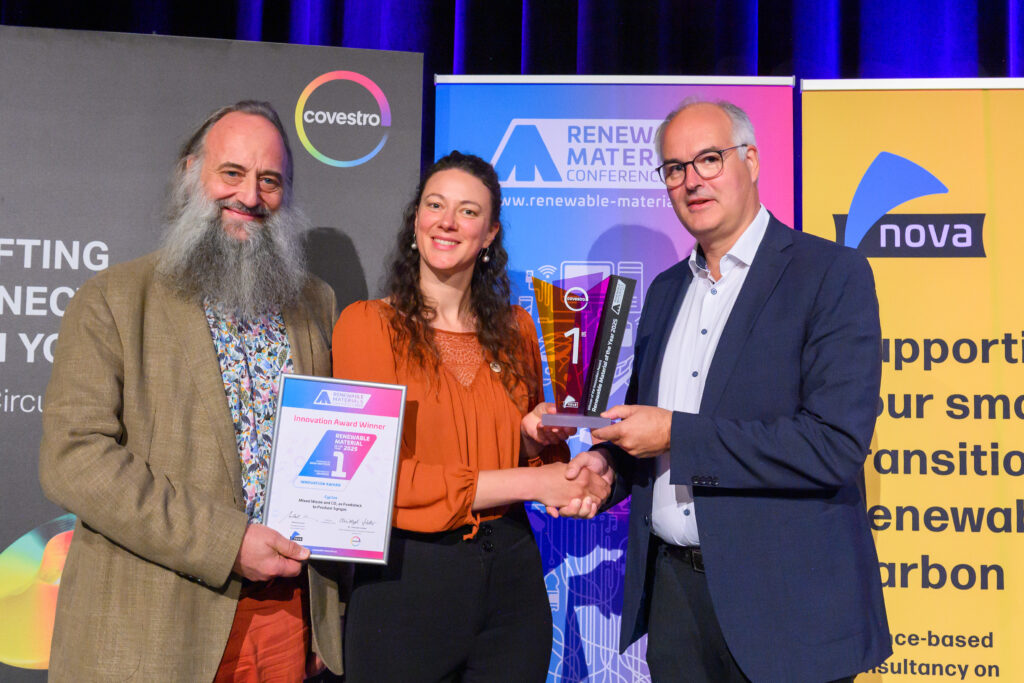
All information on the conference, as well as the registration and submission links can be found here: www.renewable-materials.eu/
All information on exhibition (limited space), workshops (book your own), advertisement (in the conference journal) and sponsoring (early on to get the full impact) can be found in the “Service Package 2026”: www.renewable-materials.eu/sponsoring/
Watch the conference video here: www.youtube.com/watch?v=r68EeAd4T_k
Read more about the last two Renewable Materials Conferences below:
RMC 2024: The Renewable Materials Conference Hits the Mark Again
www.renewable-carbon.eu/news/the-renewable-materials-conference-hits-the-mark-again/
RMC 2025: Breaking the Bubbles of the Different Renewable Carbon Sectors to Enhance the Transformation of the European Chemical Industry
www.renewable-carbon.eu/news/breaking-the-bubbles-of-the-different-renewable-carbon-sectors-to-enhance-the-transformation-of-the-european-chemical-industry/
Source: nova-Institute, press release, 2025-11-27.

In just a few years, the Renewable Materials Conference (RMC) has established itself as the international meeting place for innovators, companies and brands, investors and policymakers to come together to develop and shape the future renewable carbon economy. As in previous years, the conference organiser nova-Institute expects 400-500 participants from around the world.

The extraction of fossil resources from the ground and their use in the energy and chemical sectors is by far the largest contributor to human-made climate change, accounting for 90% of greenhouse gas (GHG) emissions. While in the energy sector decarbonisation is the way forward, there is currently the debate whether a climate-neutral chemical and plastics sector is possible without phasing out fossil fuels. But defossilisation is increasingly emerging as the only viable path forward, i.e. to change the carbon source from fossil to renewable carbon derived from biomass, CO₂ and recycling.
Defossilisation offer strategies for maintaining market access and focusing investors and financial institutions on portfolios with long-term profitability. The Renewable Materials Conference provides an important platform to explore these opportunities, address uncertainties and help companies build a future-proof, competitive position in the renewable economy, by answering the following questions: How to defossilise the chemical industry and remain competitive? How to meet the demand for fossil-free plastics? How to create sustainable carbon cycles? What role will biodegradation play in a future circular economy?

To this end, the conference will present numerous talks with experts and provide exceptional networking opportunities, feature a tabletop exhibition, poster sessions, as well as workshops on most urgent topics. There will also be the opportunity to vote for the “Renewable Material of the Year 2026” innovation award, sponsored by Covestro (DE).
Conference topics in detail – Defossilisation through Innovation
22 September: Defossilisation of the chemical industry: This critical topic area covers alternative naphtha, biorefineries, waste valorisation, chemical recycling and carbon capture and utilisation (CCU) – all of which represent solutions for both commodities and fine chemicals. Additionally, sustainable and renewable feedstocks as well as the circular economy will be addressed,
The day will conclude with a highlight Panel Discussion on “Competitiveness and Strategic Autonomy“, a crucial aspect for realising defossilsation.

23 September: Fossil-free plastics: With more than 20 polymers already commercially available from biomass, CO₂ and chemical recycling, this topic area offers solutions for all sectors, including packaging, textiles, automotive and consumer goods.
The second conference day culminates with the election of the prestigious Innovation Award "Renewable Material of the Year 2026”.
24 September: Policy and Framework, Regenerative Business Models: This day addresses policies, market demands, relevant frameworks and innovative business models that are needed for a successful transition to renewable carbon and sustainable carbon cycles.
The third day is also dedicated to the special topic of Biodegradation: What are the latest scientific and policy developments and new trends for biodegradation – the organic cycle?
From today on, early bird registration, exhibition and workshop booking, submissions for abstracts and innovations for the 'Renewable Material of the Year 2026' award are open:
- 20% discount on all tickets until 15 March 2026, afterwards 10% discount until 16 August 2026
- Deadline for abstract submission: 16 March 2026
- Deadline for submission of innovations for the "Renewable Material of the Year 2026" award: 3 May 2026

All information on the conference, as well as the registration and submission links can be found here: www.renewable-materials.eu/
All information on exhibition (limited space), workshops (book your own), advertisement (in the conference journal) and sponsoring (early on to get the full impact) can be found in the “Service Package 2026”: www.renewable-materials.eu/sponsoring/
Watch the conference video here: www.youtube.com/watch?v=r68EeAd4T_k
Read more about the last two Renewable Materials Conferences below:
RMC 2024: The Renewable Materials Conference Hits the Mark Again
www.renewable-carbon.eu/news/the-renewable-materials-conference-hits-the-mark-again/
RMC 2025: Breaking the Bubbles of the Different Renewable Carbon Sectors to Enhance the Transformation of the European Chemical Industry
www.renewable-carbon.eu/news/breaking-the-bubbles-of-the-different-renewable-carbon-sectors-to-enhance-the-transformation-of-the-european-chemical-industry/
Source: nova-Institute, press release, 2025-11-27.
